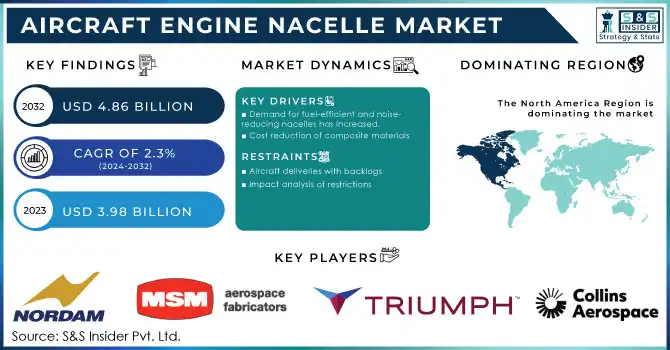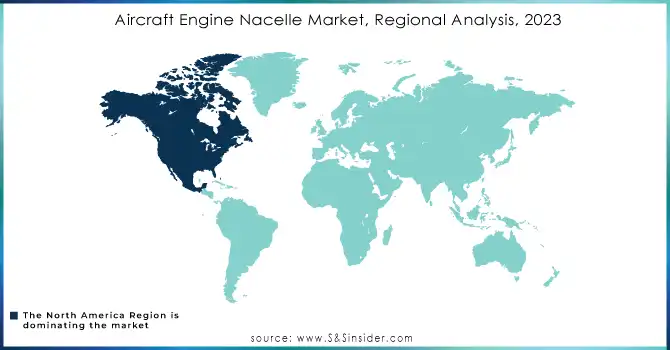Aircraft Engine Nacelle Market Report Scope & Overview:

To get more information on Aircraft Engine Nacelle Market - Request Free Sample Report
The Aircraft Engine Nacelle Market size was USD 3.98 billion in 2023 and is expected to reach USD 4.86 billion by 2032, growing at a CAGR of 2.3% over the forecast period of 2024-2032.Composites, titanium alloys, nickel-chromium, stainless steel, and aluminium alloys are used to make aircraft engine nacelles. There are various forms of aircraft engine nacelles, including rear-mounted nacelles, pylons beneath the wing, and clipped at the wing. Aircraft engine nacelles are used in civil, business, and private jet aircraft, as well as military aircraft.
The Aircraft Engine Nacelle Market is expanding rapidly as a result of increased air passenger traffic and the resulting demand for new aircraft, growing demand for fuel-efficient and noise-reducing nacelles, as well as a decrease in composite material costs . However, backlogs in aircraft deliveries are likely to stymie industry development during the projection period.
With the increased need for new aircraft, there has been a huge increase in demand for aircraft engine nacelles. A nacelle is an important part of an aircraft. It is used to house an aircraft engine, gasoline, and numerous aircraft engine systems. As a result, increased air passenger traffic and associated demand for new aircraft are likely to drive the worldwide aircraft engine nacelle market throughout the forecast period.
Market Dynamics
Key Drivers
-
Demand for fuel-efficient and noise-reducing nacelles has increased.
-
Cost reduction of composite materials
Restraints
-
Aircraft deliveries with backlogs
-
Impact analysis of restrictions
Opportunities
-
Lightweight aircraft nacelle development
-
Opportunities for growth in emerging markets
Challenges
-
Difficulty in repairing and detecting damages in composite material nacelles
IMPACT OF COVID-19
The aircraft nacelle systems market experienced a major reduction in 2020 as a result of the COVID-19 pandemic, since overall aircraft deliveries decreased significantly from the previous year. Aviation manufacturers reduced their production rates in 2020 and 2021, hampered the aircraft nacelle systems market. However, with the global distribution of vaccines, aviation passenger traffic is predicted to rebound to pre-COVID levels by 2023, resulting in increased aircraft deliveries in the second half of the forecast period.
Growing demand for business jets and military aircraft will drive development in the aircraft nacelle systems market during the first half of the forecast period, as both of these sectors have been less affected by the COVID pandemic.
Increased need for aircraft nacelles for fire protection and improved safety for various material types of aircrafts such as regional jets, mainline commercial jets, and business jets are expected to drive the worldwide aircraft nacelle market during the forecast period. Furthermore, the market is predicted to develop due to the benefits of its functions, which include deicing and the management of internal and exterior temperature variations, protection from fire and lightning, and the beautiful appeal of the aircrafts. However, it is difficult to repair and remould aircraft nacelle parts in airline engines, which limits the global aircraft nacelle market's growth.
Increased demand for aeroplane nacelles in developing countries is likely to provide a profitable growth potential for this market. The market is classified into composites, stainless steel, aluminium alloys, titanium alloys, and nickel chromium. The engine material type is classified as gas turbine, turboprop, or turbofan. It is grouped into three types based on its application: regional jets, business jets, and commercial aircrafts. It is divided into four regions Asia-Pacific, Europe, and Latin America, North America, and the Caribbean.
KEY MARKET SEGMENTATION
By Application
-
Civil Jet Aircraft
-
Business Jet Aircraft
-
Private Jet Aircraft
-
Others
By Type
-
Rear Mounted Nacelle
-
Pylons Under Wing
-
Clipped at Wing
-
Others
Bby Material
-
Composites
-
Titanium Alloys
-
Nickel Chromium
-
Stainless Steel
-
Aluminum Alloys
REGIONAL ANALYSIS
North America, Latin America, Europe, Asia Pacific,and the Middle East and Africa are all represented. The market in North America is expected to expand the most over the projected period, owing to rising demand for new aircraft, ongoing replacement of ageing fleet, and the strong presence of key companies in the region. However, the Asia Pacific market is expected to grow at the fastest rate throughout the forecast period, owing to rising demand for fuel-efficient nacelles and the region's rapid modernization of the aviation industry. Furthermore, fast industrialization and increased aircraft expenditure in China and India are expected to fuel market growth in the future.
in 2022, China's industrial production will have increased by over 14 percent year on year. The rate of growth grew by more than 7% over the previous month.

Need any customization research on Aircraft Engine Nacelle Market - Enquiry Now
REGIONAL COVERAGE:
-
North America
-
USA
-
Canada
-
Mexico
-
-
Europe
-
Germany
-
UK
-
France
-
Italy
-
Spain
-
The Netherlands
-
Rest of Europe
-
-
Asia-Pacific
-
Japan
-
south Korea
-
China
-
India
-
Australia
-
Rest of Asia-Pacific
-
-
The Middle East & Africa
-
Israel
-
UAE
-
South Africa
-
Rest of Middle East & Africa
-
-
Latin America
-
Brazil
-
Argentina
-
Rest of Latin America
-
KEY PLAYERS
The Major Players are Nordam Group LLC., MSM aerospace fabricators, Triumph Group, Collins Aerospace, Leonardo S.p.A., Bombardier MRO, ACT Aerospace, Middle River Aerostructure Systems, GE Aviation, Safran, and other players
| Report Attributes | Details |
|---|---|
| Market Size in 2023 | US$ 3.98 Billion |
| Market Size by 2032 | US$ 4.86 Billion |
| CAGR | CAGR of 9% From 2024 to 2032 |
| Base Year | 2023 |
| Forecast Period | 2024-2032 |
| Historical Data | 2020-2022 |
| Report Scope & Coverage | Market Size, Segments Analysis, Competitive Landscape, Regional Analysis, DROC & SWOT Analysis, Forecast Outlook |
| Key Segments | • By Application (Civil Jet Aircraft, Business Jet Aircraft, Private Jet Aircraft and Others) • By Type (Rear Mounted Nacelle, Pylons Under Wing, Clipped at Wing and Others) • By Material (Composites, Titanium Alloys, Nickel Chromium, Stainless Steel and Aluminum Alloys) |
| Regional Analysis/Coverage | North America (USA, Canada, Mexico), Europe (Germany, UK, France, Italy, Spain, Netherlands, Rest of Europe), Asia-Pacific (Japan, South Korea, China, India, Australia, Rest of Asia-Pacific), The Middle East & Africa (Israel, UAE, South Africa, Rest of Middle East & Africa), Latin America (Brazil, Argentina, Rest of Latin America) |
| Company Profiles | The Nordam Group LLC., MSM aerospace fabricators, Triumph Group, Collins Aerospace, Leonardo S.p.A., Bombardier MRO, ACT Aerospace, Middle River Aerostructure Systems, GE Aviation, Safran, and other players. |
| DRIVERS | • Demand for fuel-efficient and noise-reducing nacelles has increased. • Cost reduction of composite materials |
| RESTRAINTS | • Aircraft deliveries with backlogs • Impact analysis of restrictions |

